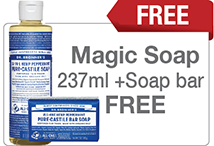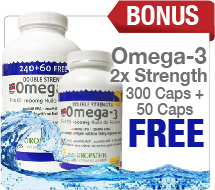Prostate Health
Updated Apr. 08th, 2024
The prostate is the organ responsible for producing the fluid part of seminal emissions, helping to control the flow of urine, and for the contractions that cause ejaculation during orgasm. It’s no wonder that when a man has a concern with his prostate that it can be troublesome.
Prostate problems occur when the gland becomes infected or swollen. Infection can occur directly in the prostate or it can be a complication of a urinary tract infection. The most common prostate condition is benign prostatic hyperplasia (BPH). It occurs in men over the age of fifty (but can occur earlier) due to hormonal imbalances, heredity, poor diet, nutrient deficiencies or high cholesterol. The growth of malignant or benign tumours can also cause prostate swelling. It is important to have your prostate monitored by your doctor. Your PSA level (prostate specific antigen) can indicate the degree of enlargement; it can also indicate whether or not you are at risk for cancer. Make at least yearly appointments past age forty for this test.
Symptoms of prostate inflammation can be mild if it develops slowly or intense if it develops quickly. Prostate infections cause fever, chills, lower back pain, rectal pain, urgency for stool and urination and painful urination. The urine can be blood or pus filled. Chronic infections may cause mild, local discomfort and may result in painful ejaculation or erection. Conventionally prostate infections are treated with antimicrobial medications. They must be fairly powerful because it is difficult to get enough medication to the prostate due to its poor blood supply. Make sure to replace the helpful bacteria in your system with a probiotic supplement after antimicrobial therapy.
Chronic prostatitis is not often related to a bacteria or the development of prostate cancer. Treatment is also more difficult because the exact cause is poorly understood. Treatment may include antibiotics, although more commonly chronic prostatitis is treated with alpha blockers, as in BPH. Tamsulosin and alfuzosin are two common alpha blockers. They serve to help relax the muscles of the prostate and bladder neck, thereby improving symptoms such as urinary retention. These medications have no effect on size or inflammation of the prostate.
BPH affects one in three men over age 50. Symptoms appear when the prostate becomes large enough to interfere with urination. Dribbling, frequent and urgent urination occur and often cause men to wake at night to urinate. Starting and stopping urination can be difficult. When bladder emptying is impaired there is an increased risk for the development of urinary stones and infections. Drug therapy for BPH uses finasteride, which blocks the conversion of testosterone into dihydrotestosterone (DHT). DHT stimulates the growth of prostate cells. Side effects of drug therapy include impotence, decreased libido and difficulty detecting prostate cancer.
New research is focusing on the anti-cancer effect that curcumin may have on the prostate, now being used both for prevention and treatment of slow developing prostate cancers. Curcumin has been shown to have both chemo-preventative and growth inhibitory activity against multiple tumour cell lines, including tumours of the prostate. Bee pollen has also been used to inhibit progression of prostate cancers once they have been diagnosed.
Prostate cancer develops slowly and it has similar symptoms to BPH. All men over fifty should have yearly prostate examinations because this is a very common type of cancer. Various drugs and surgical techniques are used to treat prostate cancer depending on the location and if it has spread. Not all prostate tumours need to be removed because most are self contained and slow growing. Surgeons will only remove a faster growing tumour because the surgery itself often causes impotence. See the article on cancer for more information. There are a number of clinically proven nutritional supplements and herbs that can provide you with significant relief for prostate conditions.
Balancing hormones – DHT (dehydrotestosterone) is a very active form of the hormone that can cause the prostate to become enlarged. The herb saw palmetto and the essential fat supplement pumpkin seed oil both help to reduce the formation of DHT and its subsequent bonding to the gland.
Most men notice a dramatic improvement in flow, and a reduction in both pain and frequency of night time trips to the bathroom. In addition, pollutants from the environment can act like hormones in the body.
In particular, residues from plastics and petrochemicals can pose serious problems because they act like the hormone estrogen, causing a number of imbalances in the body that can the lead to prostate enlargement and potentially, cancer. The supplement D-glucarate helps the liver make an enzyme that helps clear out these synthetic estrogens. The herb milk thistle can help to detoxify the liver, so that it is better able to break down excess hormones and toxic hormone analogs from the environment.
Nutrients needed for prostate health include zinc (a deficiency has been linked to prostate conditions), lycopene (an antioxidant that helps to protect the prostate from free radical damage), Essential Fats (needed for normal hormone production and controlling inflammation) and also B vitamins and the amino acids Glycine, Alanine, and glutamic acid. See the table below for specific doses.
Improving immune system activity is important for most health concerns, in the case of prostate concerns, this is no exception. In cases of prostate infection, the herbs Echinacea and golden seal can help the body to fight the infection. Vitamin C boosts the activity of specific immune cells, which are then able to kill invading bacteria or viruses much easier. The essential fat – like nutrients sterols and sterolins can help to optimize your immune response as well, in addition to helping balance hormones. In the case of a fungal infection of the prostate, it is important that you use probiotics / acidophilus with an antifungal supplement like grapefruit seed extract.
Reducing the annoying symptoms of prostate enlargement or irritation can be achieved with the above mentioned saw palmetto, but also with cleansing herbs like horsetail grass and marshmallow will usually have a soothing effect on the urinary tract.
Studies have shown that extracts of pygeum africanum can significantly lower urine residual volume and decrease incidence of nocturia, while increasing urine peak flow volume. There are now a number of combination products on the market that use primarily saw palmetto and pygeum to effectively reduce symptoms of BPH, chronic prostatitis, and in slow growing prostate cancers.
Detoxifying treatments of the gastrointestinal tract may prove beneficial for the treatment of any prostate related issue. Constipation is thought to contribute to prostate dysfunction, which then increases risk of further constipation, as bowel movements become more painful to pass. Making sure to include 25-30 g of fibre into your diet on a daily basis, along with significantly increasing water intake, can help to relieve this associated symptom. For this same reason, as well as the frequent use of antibiotics for the treatment of various prostate pathologies, probiotics are a beneficial addition to any prostate specific treatment regime.
Ejaculating on a regular basis can prevent prostate problems. Applying hot and cold packs to the groin area increases circulation and can help to speed healing for prostate conditions. Regular exercise also increases circulation. Use deep breathing or other relaxation techniques to assist bladder emptying.
Dietary approaches to support prostate health begin with adding nuts and seeds, and their oils, to the diet. They are good sources of essential fatty acids and zinc. Try flax seed, pumpkin seed, sesame seed and walnuts. Consume fish and fish oils, which also contain protective fatty acids. Add nutritional yeast to the diet as a source of B vitamins. Soy products contain phytoestrogens and are thought to be protective against prostate disorders. Other foods that are rich in vitamins, minerals and antioxidants also support the prostate, for example, fresh fruits and vegetables, cumin, garlic and maitake mushroom. Avoid the following foods because they exacerbate prostate conditions; hydrogenated fats, saturated fat, sugar, white flour products, dairy products, caffeine and alcohol.























Very interesting! Thanks!
Excellent article. What is good for the prostate especially if you have to wake up umpteen times during the night is taking Saw Palmetto. For years I have been purchasing Saw Palmetto made by Natural Factors which I have always found at National Nutrition. The product is good and so is the product line for other issues. I have tried combination remedies but what works best for me is the saw palmetto berries without anything else. I hope this is good info for someone wanting to try it out.
Great info. I have been taking Saw Palmetto which I buy from National Nutrition as they have a great lineup of products. I find this helps me with my prostate issues somewhat but not entirely.
Hello Alk177,
Saw palmetto is most people's go-to for prostate health support, we're glad this article gave you more tips as well.
Have a healthy day.
J'ai expérimenté Prostate 1 et j'avoue que votre article sur le sujet est assez éclairant. Ce produit à base de palmier nain a des effets bénéfiques sur la prostate, mais il me semble incomplet pour un soulagement efficient. c'est pourquoi je vais essayer Prostate health qui ajoute le prunier d'Afrique au palmier nain. Mes recherches sur le sujet me font croire qu'une combinaison des deux pourrait avoir un meilleur effet. Je vous reviendrai possiblement pour un compte rendu, avec l'espoir de vous donner de bonnes nouvelles. Ce qui est sûr, c'est que les produits naturels sont meilleurs, particulièrement pour ceux qui sont d'un âge certain, parce que les produits chimiques sont déjà si nombreux pour d'autres maux liés au vieillissement. Nos autres organes ont le même âge que notre prostate et les dégâts s'accumulent, malheureusement. C'est pourquoi j'encourage National Nutrition à aller toujours plus loin dans la quête des produits naturels pour les aspects les plus diversifiés de la santé.
English Translation: I experienced Prostate 1 and I admit that your article on the subject is quite enlightening. This saw palmetto product has beneficial effects on the prostate, but it seems to me to be incomplete for effective relief. that's why I'm going to try Prostate health which adds African plum to saw palmetto. My research on the subject leads me to believe that a combination of the two might have a better effect. I may come back to you for a report, with the hope of giving you some good news. What is certain is that natural products are better, especially for those who are of a certain age, because there are already so many chemicals for other aging-related ailments. Our other organs are the same age as our prostate and the damage is accumulating, unfortunately. This is why I encourage National Nutrition to always go further in the quest for natural products for the most diversified aspects of health.
Hello, Bernard,
Thank you for your comment and for sharing. We're glad you enjoyed our article and dove deeper into the topic to find a natural solution that may support your specific health needs. We hope it works out well and wish you health. If you'd like to find new healthy recipes to cook to stay healthy, check out our recipe section as well: https://www.nationalnutrition.ca/articles/healthy-recipes/
Have a healthy day!